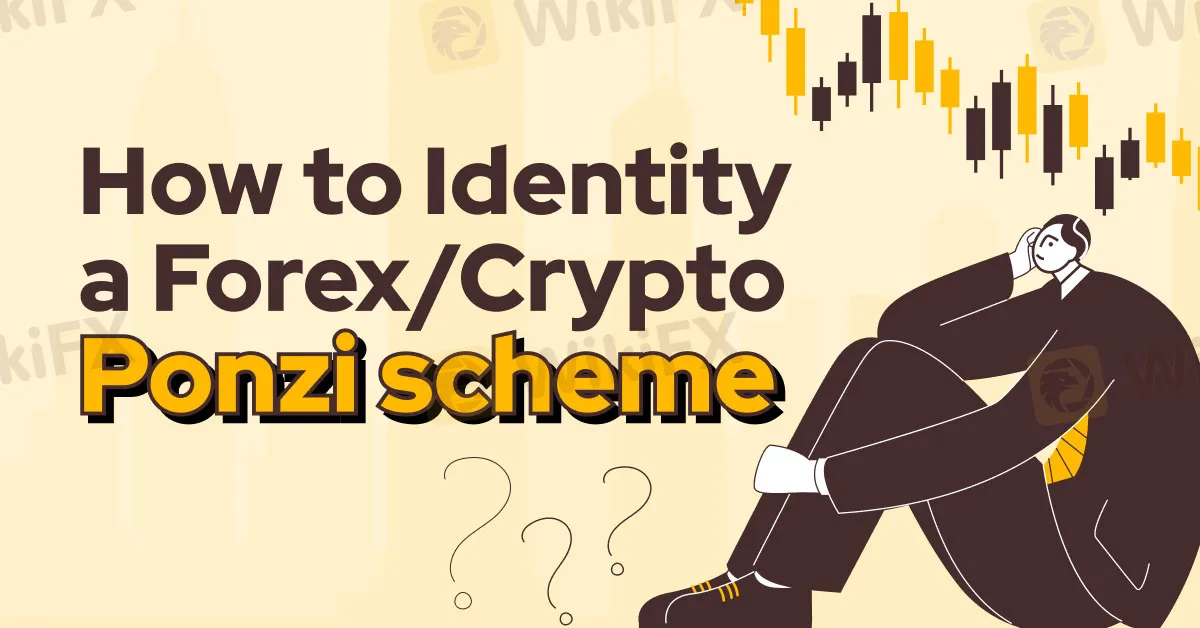简体中文
繁體中文
English
Pусский
日本語
ภาษาไทย
Tiếng Việt
Bahasa Indonesia
Español
हिन्दी
Filippiiniläinen
Français
Deutsch
Português
Türkçe
한국어
العربية
How to Identity a Forex/Crypto Ponzi Scheme
Abstract:Amid the vast opportunities of online trading, lurk hidden risks such as Ponzi schemes, deceptive practices promising high returns but often leading to financial ruin; as traders in the forex and cryptocurrency trading industry, it's imperative to remain vigilant and equipped with knowledge to identify and avoid such schemes.

In the dynamic world of online trading, where opportunities abound, there are unfortunately also risks lurking in the shadows. Among these risks are Ponzi schemes, deceptive practices that promise high returns but ultimately collapse under their own weight, leaving investors empty-handed. As traders in the forex and cryptocurrency trading industry, it is imperative to remain vigilant and equipped with the knowledge to identify and avoid such schemes.
First and foremost, one of the hallmark signs of a Ponzi scheme is the promise of unrealistically high returns on investment. These schemes often lure in unsuspecting investors with the allure of quick and guaranteed profits, far beyond what is realistically achievable in the market. As seasoned traders, it is crucial to approach any investment opportunity with a healthy dose of scepticism and to scrutinize claims of extraordinary returns with caution.

Another red flag to watch out for is a lack of transparency and accountability from the individuals or entities behind the investment scheme. Ponzi operators often operate in the shadows, avoiding scrutiny and providing vague or evasive answers to inquiries about their operations. Legitimate trading platforms and investment opportunities should be transparent about their business practices, regulatory compliance, and the individuals involved in managing the funds.
Additionally, Ponzi schemes typically rely on a constant influx of new investor funds to pay out returns to existing investors. This unsustainable model can often be identified by promises of referral bonuses or incentives for recruiting new investors. As traders in this industry, it is essential to recognize that legitimate investment opportunities do not rely on recruiting new investors to sustain returns.
Furthermore, Ponzi schemes may also lack proper regulatory oversight or licensing, operating in the shadows to avoid scrutiny from financial authorities. As responsible traders, it is crucial to conduct due diligence on any trading platform or investment opportunity, ensuring that it is registered with the appropriate regulatory bodies and adheres to industry best practices. To do this efficiently, download the free WikiFX mobile application or visit www.wikifx.com. WikiFX is a global forex regulatory query platform that stores verified information on over 50,000 brokers worldwide.

In conclusion, it is incumbent upon online traders to remain vigilant and informed about the risks posed by Ponzi schemes and other fraudulent practices. By staying educated, exercising caution, and conducting thorough due diligence, we can protect ourselves and our investments from falling victim to these deceptive schemes. Remember, if an investment opportunity sounds too good to be true, it probably is.

Disclaimer:
The views in this article only represent the author's personal views, and do not constitute investment advice on this platform. This platform does not guarantee the accuracy, completeness and timeliness of the information in the article, and will not be liable for any loss caused by the use of or reliance on the information in the article.
Read more

WikiFX Announcement: Suspension of Weekly Simulated Trading Competition
Since its launch in early 2023, the WikiFX Weekly Simulated Trading Competition has successfully hosted 99 consecutive rounds, attracting enthusiastic participation from traders worldwide and creating countless thrilling trading moments.

What Can Forex Traders Learn from Ne Zha?
The animated blockbuster Ne Zha: Birth of the Demon Child tells the story of Ne Zha’s journey to defy fate and take control of his own destiny. Beyond being an inspiring tale filled with action and character growth, the film conveys profound life lessons - many of which resonate deeply with the world of forex trading.

Retirement Savings Wiped Out: RM500,000 Lost to a Scammer named Richard Ong
A retiree was deceived into parting with more than RM500,000 after falling victim to an elaborate investment scam that promised substantial returns.

The Dark Side of Social Media Investments: How a Manager Lost RM2.08 Million
A Malaysian company manager suffered financial losses amounting to RM2.08 million after becoming the victim of an investment scam promoted through Facebook.
WikiFX Broker
Latest News
Forex Market Outlook: Key Currency Pairs and Trading Strategies for March 24–28, 2025
Singapore Police Crack Down on Scams: $1.9M Seized, 25 Arrested
Gold Prices Swing Near Record Highs
XTB Opens New Dubai Office
Africa Cybercrime Bust: Over 300 Arrested in Fraud Crackdown
The Growing Threat of Fake Emails and Phishing Scams
Hong Kong Banks and Authorities Collaborate to Freeze Fraudulent Accounts Faster
SocialFi and the Forex Market: A New Era for Decentralized Social Trading?
Is Billion Bucks Fx Scam?
BaFin Halts USDe Token Issuance, Citing Serious Compliance Failures
Currency Calculator







